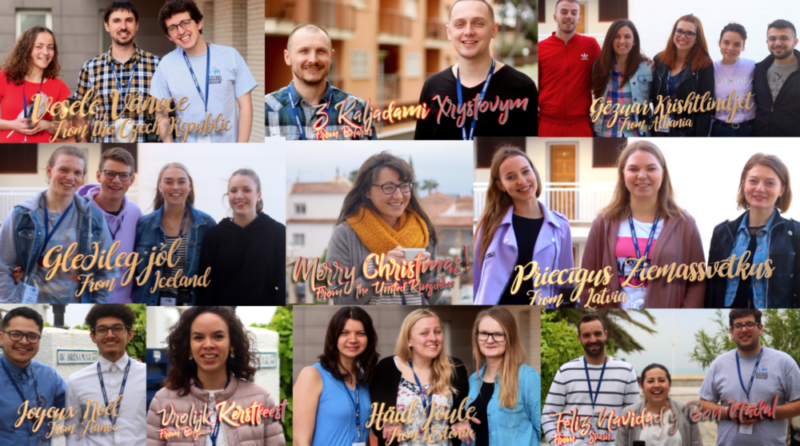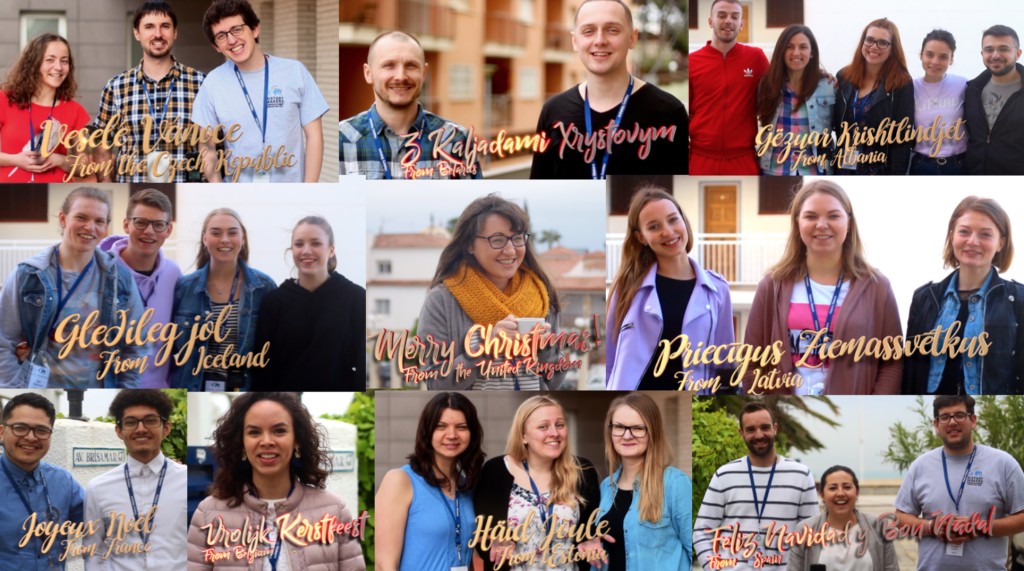European Christmas Traditions from Andrew Ishak on Vimeo.
In February, I got a note from a friend of my in-laws, Wes Griffin. Wes lives in Atlanta and had seen that I was working on a yearlong project to get better at videomaking. Wes wanted to know if I was interested in going to Spain in the spring to attend an evangelical leadership conference to film and create a few videos about the stories of people who are trying to spread Christianity in Europe.
I have to be honest about my first thoughts. I am a Christian. I follow the teachings of Jesus Christ. But Christian evangelism sometimes makes me nervous. My personal experience growing up was that the people who were the loudest about Christianity (not necessarily “Evangelical” Christians) were often those who were the worst examples of living a Christian life: they were more likely to be unkind, or self-righteous, or lack perspective on other religions and cultures. While this doesn’t describe Wes in the slightest, I knew I would be spending time with many people I had not met yet. And this was going to be an evangelical conference, which I had never been to before.
In addition, the dominant narrative about American evangelicals is that they feel persecuted. And that just bugs me. Christians in Egypt are killed regularly for their beliefs. You can add every other country in the Middle East to that, and China, too. Meanwhile, 91 percent of members of U.S. Congress identify as Christian, and every single Supreme Court justice does as well. In my opinion, it’s easier to be a Christian in the U.S. than to be any other religion, and it’s easy to be a Christian in the U.S. than in most any other country. We have it easy in the U.S. and we don’t know it.
I was also in a weird place at the time regarding my own church and spirituality. I had depressing experiences as a church board member, and our priest has just dissolved the board in January for political reasons (which I later learned was a regular occurrence in our particular church, so I’m not as special as I thought). And I had depressing experiences as a congregant, where I don’t understand 25 percent of what’s being said and my wife and kids don’t understand 50 percent. And I wasn’t sure if I wanted to keep going.
Which brings me back to the invitation from Wes. I wanted to meet more people from different walks of life, and I wanted to see Christianity outside the politics of my church. Which is why I decided to go to the summit.
What I can say with certainty is that attending this summit was one of the most refreshing experiences of my life. I had been to many Coptic Christian retreats as a kid, but never an evangelical Christian conference. Simply as a researcher behind the camera, it was an eye-opening experience. It was so enlightening to see people explore and express their faith in ways that I hadn’t really experienced before. It was soul-affirming. And I learned a lot about culture and faith, and how little I know about the Christian experience around the world.
I also felt re-energized in my own spiritual life. The idea that stuck with me the most, and I forgot who said it: Your individual parish will not totally fulfill your spiritual needs. Sunday will not totally fulfill your spiritual needs. You have to have a personal relationship with God, and you have to do it Monday through Saturday. That’s most of your life.
But my favorite aspect of the event was the people. There were attendees from over 20 countries and they were all so wonderful and kind and worldly. I loved the meals we ate together and the conversations we had. I really enjoyed the soccer tournament on the last night in which I was on the only team that wasn’t speaking English (I made it work in Spanish). That’s a good story for another time. And I loved learning about their cultures.
So, about this video: I wanted to capture something that shows how people from different cultures can all experience something wonderful but in their own way. It showcases Christmas traditions, foods, and greetings from 16 countries in Europe, with people from Albania, Belarus, Belgium, Czech Republic, Estonia, France, Georgia, Iceland, Latvia, Lithuania, Macedonia, Romania, Spain, Turkey, the UK, and Ukraine. These are all real traditions.
Special thanks to Wes and Joy Griffin who head the International Leadership Institute for inviting me to be a part of the summit. Wes saw that I was working on a yearlong project to get better at something, and he gave me an opportunity to do that in a unique setting.
Thank you also to Martin Durham, Penny Dewick, and Andrew Dewick, Kerygma 180, History Makers Europe, as well as Bethany Dahl for her assistance.
Translators
Ragaa Ishak (French)
Hedwich Kuipers (Dutch)
Amy Hyde Smith and Andrew Ishak (Spanish)
Featuring
1. Albania – Ina Yzeiraj, Evi Grillo, Megi Herri, Arti Konica, Aldi Xhafa
2. Belarus – Sergey Zaugolnikov and Sergey Orlov
3. Belgium – Neha De Wolf and Kevin Vega
4. Czech Republic – Tomáš Kolman, Jordan Tomeš, and Jitka Vlčinská
5. Estonia – Grete Lepa, Mareta Nõmme, Johanna-Margret Ojaots
6. France – Samuel Alvear
7. Georgia – Rachel Hardgrave, Lela Shekiladze
8. Iceland – Einar Fjalarsson, Jóel Fjalarsson, Dagný Helgadottir, Bína Hjaltadottir
9. Latvia – Velta Osipova, Diāna Gāga, and Alīna Nikoļska
10. Lithuania – Jonas Petrikas, Kate Metelak, Sasha Popov
11. Macedonia – Sara Pavlova, Goran Nasevski, Ana Marija Pavlova
12. Romania – Emy Goicovici and Bogdan Mindru
13. Spain – Silvia López Saravia, Hechan Zentar, and Eduardo Carvajal Lettuce
14. Turkey – Sedat Selamet and Guzin Selamet
15. UK – Charlotte Hendy
16. Ukraine – Andriy Kolbovsky
made by Andrew Ishak
Filmed in Coma-ruga, Spain in April 2018
Equipment:
Canon Xti
Canon 70D
Sigma 18-50mm f/2.8 (which has since died 🙁 )
Canon 50mm f/1.8
Zoom H2n
Manfrotto 5001B stand

